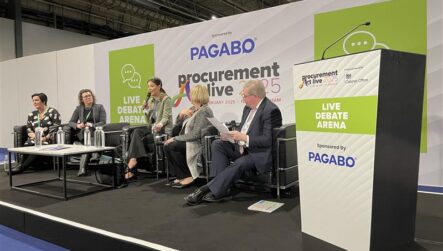The proof is in the pudding: Why schools are increasingly turning to catering frameworks

While most people in the United Kingdom are fortunate to have a better quality of life than those in many countries around the world, it is a shared belief that schools should offer young people a reliable supply of consistently nutritional meals. In discussion with education provider Red Kite Learning Trust (RKLT), we have been exploring how the use of framework agreements can alleviate complications associated with catering supplies and improve logistics.
In 2021, official government data revealed that the number of children in England receiving free school meals climbed to more than 1.6 million – equating to nearly 21 per cent of all students, which rose from 17.3 per cent in January 2020. Despite government funding available to support schools in offering these meals, the increased demand highlights the importance to a growing number of students.
Considering the stringent guidance and legislation in place, provision of school meals is kept to a standard that must be regularly governed. For schools that have a never-ending list of responsibilities resulting from their duty of care, the benefits offered by a framework agreement are becoming more apparent.
Whether it is time or cost savings a school craves to improve its processes and efficiency, a relationship between framework provider and education provider showcases a possibility for both.
Simplification of the shopping experience
For Red Kite Learning Trust, meeting the catering demands of its 13 schools across North Yorkshire and Leeds is no small undertaking, and outsourcing support is a decision that must be well informed. Since beginning to use our Food Broker Services Framework in early 2021, the tangible and intangible benefits have been plentiful.
Reflecting on the experience procuring through single supplier e-foods, catering operations manager at RKLT, Louise Bullman, explained: “We have always taken pride in providing a catering service across our academies that pupils and parents can rely on but doing this with the help of a framework has been an absolute game changer.
“During our first year using the framework we have experienced a 39 per cent reduction in volume of invoices, which brings the total number down by 1160 and saves our purchasing team hours spent liaising with multiple suppliers instead of what is now one primary contact at e-foods. Breaking this down further, one hour per week saved in admin time is 513 hours annually across our teams and more than £5,000 in monetary terms.
“Each of our schools has access to a functional online shop where live product data and orders can be placed, resulting in one consolidated invoice prepared by e-foods before being sent to each site’s finance team for approval. This meant that rolling out the new system was particularly easy because training could be given at the same time and instances of absence mean tasks are not left incomplete. The simple interface has been likened to the accessibility of shopping with firm favourite online retailer Amazon.
“Helpfully, a fixed pricing structure means that menus can be costed with confidence and price changes come with forewarning. From a management perspective, total visibility is available, and delegation is much easier to oversee.”
Handing over the complicated elements
The Food Broker Services Framework, like all of our offerings, is OJEU compliant, ensuring that RKLT need not worry about the risk of procurement outside of the standards it has to meet as a publicly funded organisation.
Commenting on the headaches that this essential framework feature prevents, our Managing Director, Jason Stapley, said: “Constantly monitoring spend to maintain compliance is a difficult and time-consuming task but all of our frameworks take on this responsibility for the user. It was an ideal time for RKLT to begin using a framework as its steady growth and the associated spending meant compliance needed extra attention.
“While we offer the resources to reduce admin and research, all of our framework suppliers offer a digital platform to increase transparency. Everything from reporting to queries can be managed in one place and allow the user to control outcomes. We pay close attention to the market to help users achieve the best return on investment while forecasting if further changes are likely to be needed.
“New legislation can cause the need for rapid process adjustment. Providing a data link for nutritional data merge, the Food Broker Services Framework has enabled RKLT a smooth transition in consideration of Natasha’s Law, which was introduced in October 2021 to protect allergy suffers and give them confidence in the food they buy.”
Responding to unpredictable changes
Two major events in the UK rocked supply chains and changed daily operations for almost all organisations Brexit and the Covid-19 pandemic. The impact on RKLT was no less dramatic, but from a catering perspective the value of a framework has truly proven its worth.
Louise continued: “Providing a meal service that worked alongside the year group bubble measures that were in place in 2021 was a unique experience for schools across the nation and the main challenge came down to a balance between space and time. To seat groups separately and give each group adequate dining time is very hard, with most schools having to consider using non catering spaces, coined ‘satellite serveries’, as dining areas.
“At our 13 schools, a hybrid approach combining ‘grab and go’ alongside separate communal dining meant that we could protect food options and presentation where possible. Of course, the safety of pupils is of paramount importance so having alternative options made possible by our new supplier really reassured us through an unpredictable time.
“There is also the onsite staff body to consider and the relationship with e-foods highlighted the collaboration harnessed through a framework agreement. The supplier donated 4,000 high-quality face masks upon our return to in-person teaching from March so that we had plenty of availability for our catering teams, teaching staff and pupils.
“Under normal circumstances, access to special food items for national events such as Vegetarian Week and World Food Day make mealtimes more fun and valuable for children, but last year was like no other as a result of supply chain and inflation issues.
“Having said this, e-foods has supported both suppliers and clients through this difficult period, asking us to order three days in advance and reducing delivery days from three to one, to allow for driver shortages and sourcing alternative supply in case of emergency.
“It’s the extra insights we’re gaining from the framework that also stand out as an improvement compared to our previous system. Regular live market updates have helped us plan more efficiently and e-foods has managed to absorb inflation much longer than we expected. The only cost change we have experienced so far is in the meat sector. The supplier’s buying power has meant priority for our schools, which I fear we may have faced a larger impact without.”
Food for thought
Procurement of any products or services can be challenging, but with the political and social backdrop we find ourselves in there is growing evidence for collaboration involving experts able to increase visibility. Schools are a vital part of the communities we live in and frameworks pledging to leave a long-lasting social impact, free of charge, may well be the vehicle for catering supplies that schools didn’t know they needed until now.
Interested in learning more about how this framework can help you? Get in touch today.
Discover our frameworks
































